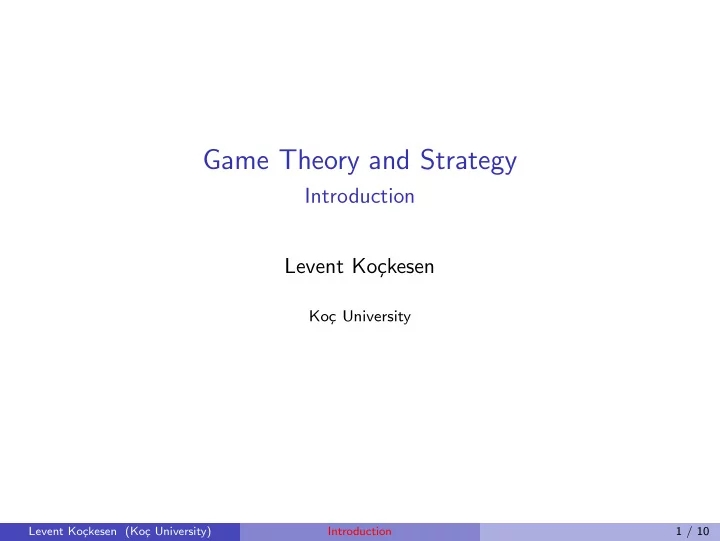

Game Theory and Strategy Introduction Levent Ko¸ ckesen Ko¸ c University Levent Ko¸ ckesen (Ko¸ c University) Introduction 1 / 10
Game Theory: Definition and Assumptions Game theory studies strategic interactions within a group of individuals ◮ Actions of each individual have an effect on the outcome ◮ Individuals are aware of that fact Individuals are rational ◮ have well-defined objectives over the set of possible outcomes ◮ implement the best available strategy to pursue them Rules of the game and rationality are common knowledge Levent Ko¸ ckesen (Ko¸ c University) Introduction 2 / 10
Example 10 people go to a restaurant for dinner Order expensive or inexpensive fish? ◮ Expensive fish: value = 18, price = 20 ◮ Inexpensive fish: value = 12, price = 10 Everbody pays own bill ◮ What do you do? ◮ Single person decision problem Total bill is shared equally ◮ What do you do? ◮ It is a GAME Levent Ko¸ ckesen (Ko¸ c University) Introduction 3 / 10
Example: A Single Person Decision Problem Ali is an investor with $100 State Good Bad Bonds 10% 10% Stocks 20% 0% Which one is better? Probability of the good state p Assume that Ali wants to maximize the amount of money he has at the end of the year. Bonds: $110 Stocks: average (or expected) money holdings: p × 120 + (1 − p ) × 100 = 100 + 20 × p If p > 1 / 2 invest in stocks If p < 1 / 2 invest in bonds Levent Ko¸ ckesen (Ko¸ c University) Introduction 4 / 10
An Investment Game Ali again has two options for investing his $100 : ◮ invest in bonds ⋆ certain return of 10% ◮ invest it in a risky venture ⋆ successful: return is 20% ⋆ failure: return is 0% ◮ venture is successful if and only if total investment is at least $200 There is one other potential investor in the venture (Beril) who is in the same situation as Ali They cannot communicate and have to make the investment decision without knowing the decisions of each other Beril Bonds Venture Bonds 110 , 110 110 , 100 Ali Venture 100 , 110 120 , 120 Levent Ko¸ ckesen (Ko¸ c University) Introduction 5 / 10
Entry Game Strategic (or Normal) Form Games ◮ used if players choose their strategies without knowing the choices of others Extensive Form Games ◮ used if some players know what others have done when playing P Out In C 0 , 4 A F 2 , 2 − 1 , 0 Levent Ko¸ ckesen (Ko¸ c University) Introduction 6 / 10
Investment Game with Incomplete Information Some players have private (and others have incomplete) information Ali is not certain about Beril’s preferences. He believes that she is ◮ Normal with probability p ◮ Crazy with probability 1 − p Beril Beril Bonds Venture Bonds Venture Bonds 110 , 110 110 , 100 Bonds 110 , 110 110 , 120 Ali Venture 100 , 110 120 , 120 Venture 100 , 110 120 , 120 Normal ( p ) Crazy ( 1 − p ) Levent Ko¸ ckesen (Ko¸ c University) Introduction 7 / 10
The Dating Game Ali takes Beril out on a date Beril wants to marry a smart guy but does not know whether Ali is smart She believes that he is smart with probability 1 / 3 Ali decides whether to be funny or quite Observing Ali’s demeanor, Beril decides what to do 2 , 1 1 , 1 marry marry quite A funny dump dump 0 , 0 − 1 , 0 (1 / 3) smart B B Nature 2 , 0 − 1 , 0 (2 / 3) dumb marry marry quite A funny dump dump 0 , 1 − 3 , 1 Levent Ko¸ ckesen (Ko¸ c University) Introduction 8 / 10
Game Forms Information Complete Incomplete Strategic Form Strategic Form Games with Games with Simultaneous Complete Incomplete Information Information Moves Extensive Form Extensive Form Games with Games with Sequential Complete Incomplete Information Information Levent Ko¸ ckesen (Ko¸ c University) Introduction 9 / 10
Outline of the Course 1. Strategic Form Games 2. Dominant Strategy Equilibrium and Iterated Elimination of Dominated Actions 3. Nash Equilibrium: Theory 4. Nash Equilibrium: Applications 4.1 Auctions 4.2 Buyer-Seller Games 4.3 Market Competition 4.4 Electoral Competition 5. Mixed Strategy Equilibrium 6. Games with Incomplete Information and Bayesian Equilibrium 7. Auctions 8. Extensive Form Games: Theory 8.1 Perfect Information Games and Backward Induction Equilibrium 8.2 Imperfect Information Games and Subgame Perfect Equilibrium 9. Extensive Form Games: Applications 9.1 Stackelberg Duopoly 9.2 Bargaining 9.3 Repeated Games 10. Extensive Form Games with Incomplete Information 10.1 Perfect Bayesian Equilibrium 10.2 Signaling Games Levent Ko¸ ckesen (Ko¸ c University) Introduction 10 / 10
Recommend
More recommend